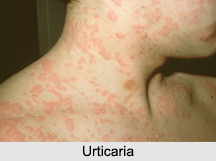 Urticaria is a type of skin rash much striking for dark red, raised, scratchy bumps. It is also known as `Hives` which are frequently stimulated by allergic reactions. An allergic reaction takes place when the body`s immune system over-responds, or is hypersensitive to particles recognised as Allergens. This skin disease is also known as nettle rash, as the rash of hives resembles the sting of a nettle. The disease may be acute, chronic or recurrent and is deemed to be an allergic trigger like hay fever and asthma.
Urticaria is a type of skin rash much striking for dark red, raised, scratchy bumps. It is also known as `Hives` which are frequently stimulated by allergic reactions. An allergic reaction takes place when the body`s immune system over-responds, or is hypersensitive to particles recognised as Allergens. This skin disease is also known as nettle rash, as the rash of hives resembles the sting of a nettle. The disease may be acute, chronic or recurrent and is deemed to be an allergic trigger like hay fever and asthma.
Types of Urticaria
There are two types of Urticaria namely; Acute and Chronic Urticaria. Acute Urticaria usually shows up a few minutes after contact with the allergen and can last a few hours to several weeks. Chronic Urticaria refers to hives that continues for six weeks or more.
Causes of Urticaria
The majority of patients suffering from chronic hives have an unidentified cause. A severe viral infection is another common cause of acute Urticaria. Less common causes of hives incorporate friction, pressure, temperature extremes, exercise and harsh sunlight.
Urticaria may result from digestive disorders like mechanical irritation in the digestive tract or toxaemia. Drugs like aspirin, penicillin, serum, quinine, ipecac, turpentine and morphine can aid to aggravate it. Particular foods like strawberries, tomatoes, cucumbers, mushrooms, oatmeal, wheat, nuts, fish, eggs, chocolate, cheese, butter and sausage often induces hives in susceptible individuals. The bites of bed bugs, wasps, bees, mosquitoes, fleas and specific kinds of caterpillars may also produce the disease. Irritations of the uterus or associate structures can also cause the disease. It may also result from emotional excitement.
 Symptoms of Urticaria
Symptoms of Urticaria
The symptoms of Urticaria are red and white patches coming out on the skin, accompanied by burning, intense itching and stinging. Rubbing and scratching usually only aggravates the hives. The outbreak of Urticaria is sudden and the disease may affect either a part or whole of the body. Other symptoms which accompany hives comprise fever, digestive disturbances and prostration.
Treatment of Urticaria
Treatment of Urticaria demands strict and solemn attention which needs to be treated both from the internal and external physical body. The Urticaria patient can embark upon a well-balanced diet consisting of seeds, nuts, grains, vegetables and fruits. The emphasis should be laid upon fresh fruits and raw vegetable salad. Certain home remedies have been found beneficial in the treatment of Urticaria. The patient should avoid exposure to cold water. Fresh air and sunlight are also essential to the treatment and the sufferer should frequently expose his body to the sun and spend as much time outdoors as possible.




















